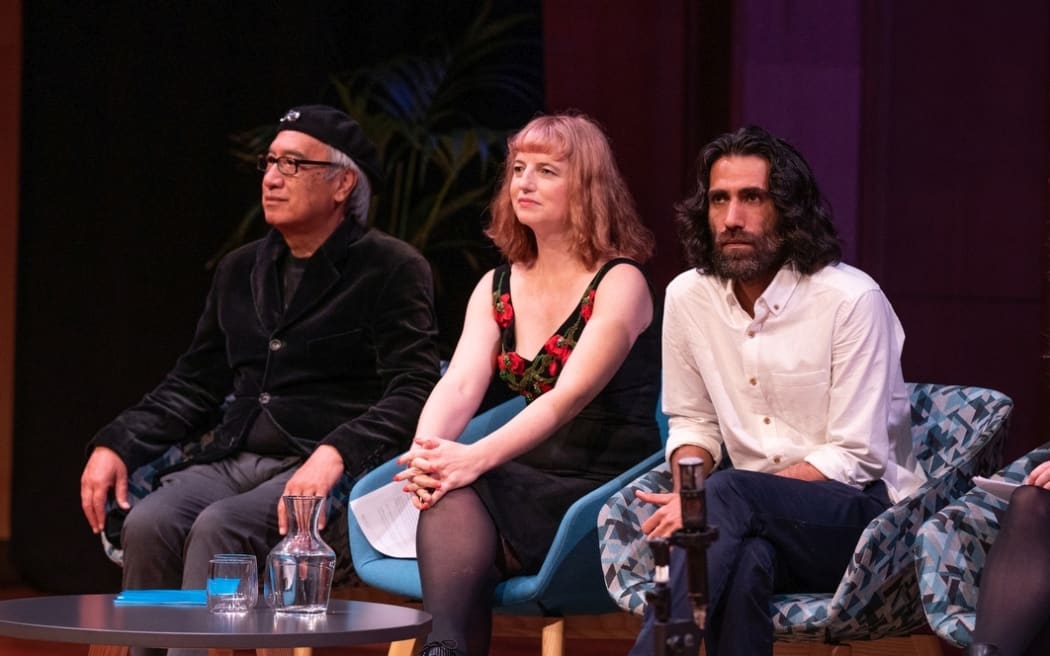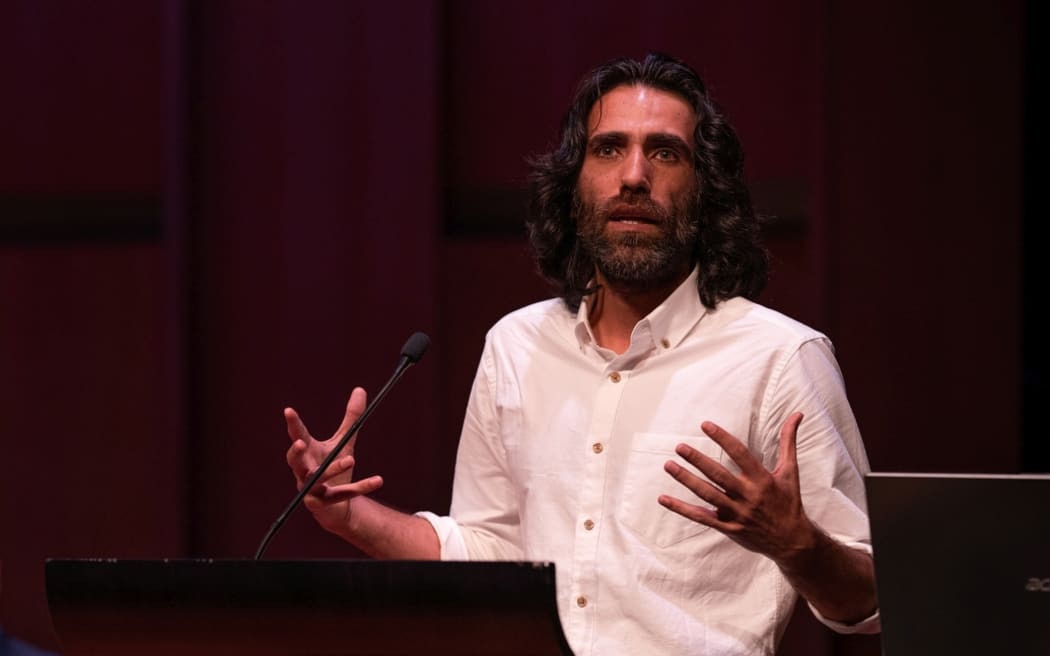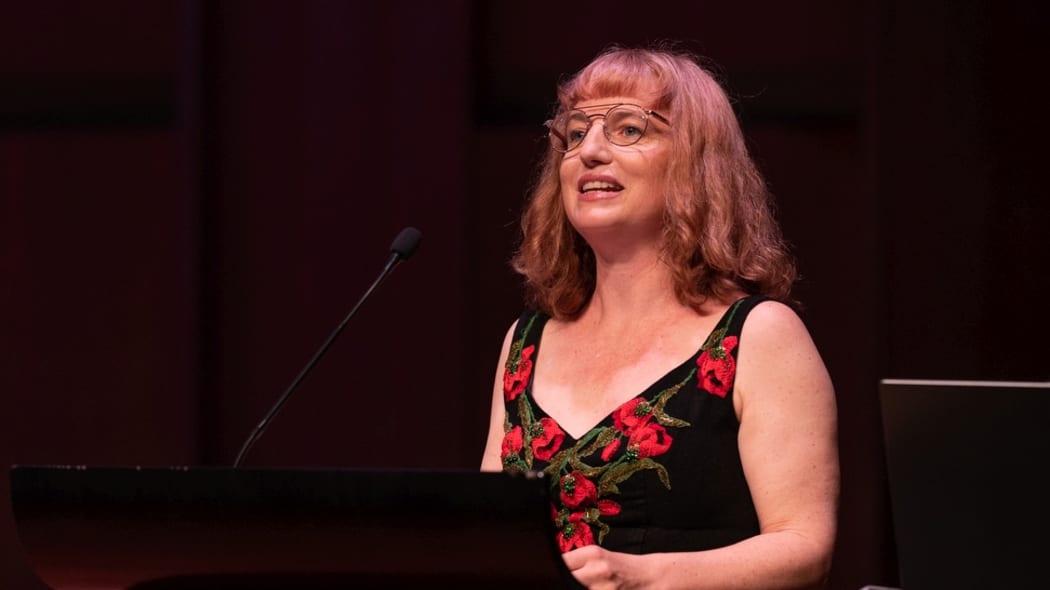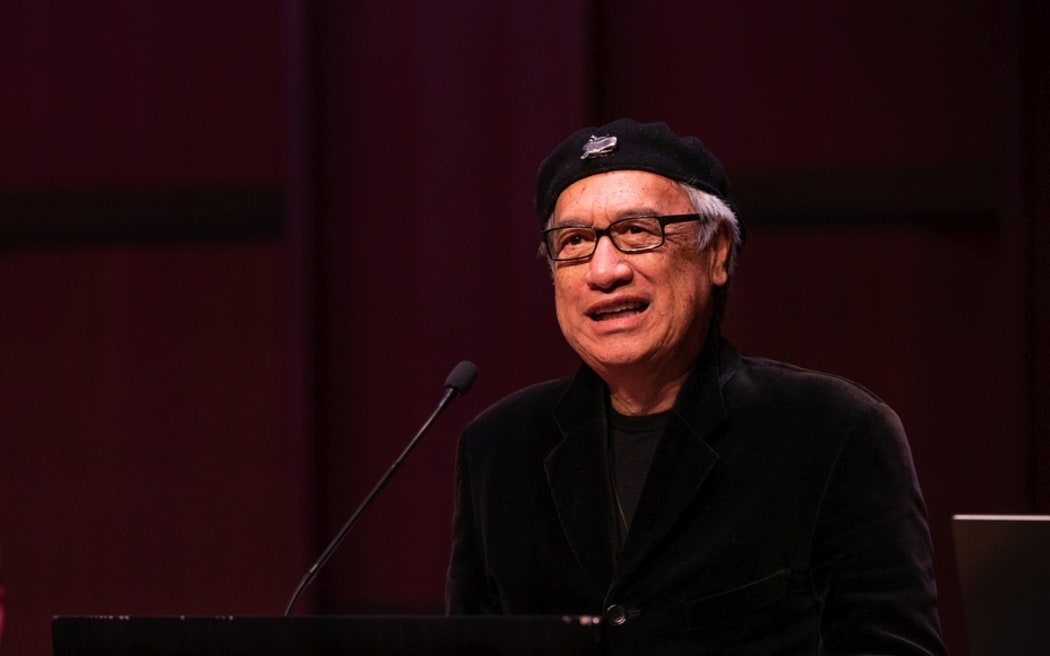
Witi Ihimaera, Laura Jean McKay, Behrouz Boochani Photo: WORD Christchurch
Hosted by John Campbell, three distinguished writers share stories created for this event. Their narratives are deeply revealing about the authors’ own lives, but also the state of Aotearoa New Zealand
Highlights of the session
Behrouz Boochani

Behrouz Boochani Photo: WORD Christchurch
Kurdish-Iranian writer Behrouz Boochani was relieved to be granted refugee status in New Zealand in August 2020. He had spent six years in detention in Papua New Guinea after unsuccessfully seeking asylum in Australia. At that time he said it had been a long journey to get to this point and a struggle dealing with systems that deprived him of basic human rights.
I should say something based on my experience.
It is my understanding that courage is very related to hopelessness. When you are like that you can do dangerous things. You can take risks. But for me, my understanding of bravery is that it’s really difficult in this complicated world to stay human.
To be honest, to keep your principles. It’s very, very difficult.
The bravest people are those who still stand up for humanity, who still keep these principles alive. It’s very difficult to be like that. My experience here when I got freedom it became big news and it was very difficult to say no to some offers.
For example, I never looked at my story as a personal story, or a commercial story. I never wanted to be a celebrity. It’s easy to be this.
I have been struggling to not let those people – this capitalist system – reduce this tragedy which is not my tragedy (it’s a bigger story) to this [commercial] culture that I’m talking about. It’s very difficult.
Still, I am struggling, but I am not sure if I became part of the system or not. In some ways, I became a part of the system. It’s very difficult, a very complicated thing, but that is my understanding of bravery.
Laura Jean McKay

Laura Jean McKay Photo: WORD Christchurch
The full text of Laura's story is available on The Spinoff
To be honest, I begged her not to go. I wasn’t considering how she’d lost her ability to move or that she’d been here for 93 years and her last sentence was “I’ve had just about enough of this.”
I said, “Nanna, don’t leave me here.” I meant to add “alone”. She gave me a look that was the very definition of world-weary.
Zoologist Edward O. Wilson says we’re not living in the era of the Anthropocene – the age of humans – but rather in the Eremocene, the Age of Loneliness. In the Eremocene, we watch extinctions occur: photos of Lonesome George – the last surviving Pinta Island tortoise; the sonar trails of the only Christmas Island Pipistrelle microbat; the fruitless search for the South Island kōkako – until we are left alone in an environment entirely of our own making.
I bring this up because, sitting in that nursing home about to lose a woman who was more parent than grandmother to me, I felt a loneliness that seemed to span an epoch. Nanna was still there, I could touch her hand, but I was bearing witness to her lasts: words, meal, breath. A soft-boiled lunch arrived on a trolley but Nanna couldn’t eat it. She was having trouble swallowing and, at that age and stage of dementia, she wouldn’t be kept alive. I rubbed water over her lips, letting some go into her mouth. She nodded firmly. Good idea.
In the coming years, this desolate feeling would expand beyond Nanna’s small nursing home room, beyond my grief, to the collective loneliness that is this moment in time. To stay and bear witness is not particularly courageous. Not many people with my level of privilege – a tauiwi woman in the Antipodes – know the sort of courage that most people need daily. I have too much blood on my hands (notice that I don’t have the courage to write about that here either).
But if this is about facing fears: I have some. Ecofeminist Donna Harraway talks about Staying with The Trouble, which “requires learning to be truly present, not as a vanishing pivot between awful or edenic pasts and apocalyptic or salvific futures, but as mortal critters entwined in myriad unfinished configurations of places, times, matters, meanings”.
Witi Ihimaera

Witi Ihimaera Photo: WORD Christchurch
The most courageous thing I ever saw was on a beach in British Guiana. My friends had taken me there at night, and I wasn’t sure what to expect. Then came the blood-red dawn, and in the sky, the massing of huge black clouds of seagulls.
And, beyond the breakwater, the sea began to foam with seething fish. Then suddenly, up from the sand, came little turtles. Hundreds of them. And they began their terror-stricken run across the beach to the sea, their fins working like crazy, to try to get to the sea. Did they know of the gulls? Did they know of the fish?
What they did know was they had to survive. Mindlessly triggered by some force of nature to beat the odds, to go beyond that blood-red sunrise, those screeching gulls, and the fish jumping in ecstasy, awaiting their kai. All I could think of was, “Go you little beggars, Go.”
More about the speakers
Behrouz Boochani
Behrouz Boochani is a Kurdish-Iranian journalist, scholar, cultural advocate, writer and filmmaker. He is the author of No Friend But The Mountains, which portrayed life inside Australia’s notorious refugee detention centre on Manus Island. It won the 2019 Victorian Prize for Literature, the Special Award at the NSW Premier’s Literary Awards, the Non-Fiction Book of the Year Australian Book Industry Awards and the National Biography Prize. Boochani is currently Senior Adjunct Research Fellow at the Ngāi Tahu Research centre at the University of Canterbury.
Laura Jean McKay
Laura Jean McKay is the author of The Animals in That Country (2020) and Holiday in Cambodia (2013), shortlisted for three national book awards in Australia. Her work appears in the Guardian, Best Australian Stories and the North American Review. Laura is a lecturer in creative writing at Massey University with a PhD from the University of Melbourne focusing on literary animal studies. She is the ‘animal expert’ presenter on ABC Listen’s Animal Sound Safari.
Witi Ihimaera
Witi Ihimaera was born in Gisborne in 1944 and began his career as a writer in 1970. His books Pounamu Pounamu (1972) and Tangi (1973) were the first collection of short stories and novel to be published by a Māori. Ihimaera has subsequently become one of the world’s most important indigenous writers with highly regarded novels and fiction collections to his credit like The Matriarch (1986) The Whale Rider (1987, made into an internationally successful film in 2002) Bulibasha (1995) and Sleeps Standing (2014). His two memoirs Māori Boy (2015) and Native Son (2019) will soon be joined by a third. His next book Navigating the Waka comes out this year. Ihimaera is also an editor of 19 books of New Zealand and Maori culture art and fiction. He edited with Tina Makereti Black Marks on the White Page (2017) and Purakau (2018) with Whiti Hereaka. He lives in Auckland.
This session was recorded in partnership with WORD Christchurch


